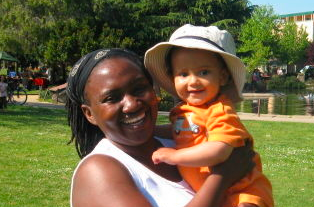A Tribute to All Who Mother
I became a mother three years after my own mother died of cancer. She died peacefully surrounded by her immediate family. She left a gaping hole in all of us who had been profoundly touched by this amazing woman named Zodwa.

I had always looked up to my mother, even during my adolescent years when our relationship was quite rocky. But it was not until she died that I fully appreciated that my sense of self was so strongly tied to her. I don’t say this just in relation to the fact that the lessons she taught me still guide what and how I do most things (for example, no matter how late I am, I still make my bed before I leave the house!).
I mean that by the very person she was—political activist, community worker, entrepreneur—mentor, cheerleader, connector—womanist*, human rights defender, culturalist**—she shaped me to be the person that I am today.
And even though I was in my thirties when she died, I realized just how much I still leaned on her and learned from her. In fact, I was comforted by her very presence, even when we lived on separate continents.
She was and continues to be my strength.
So I mother my four-year old son, Khaya, with great humility and a sense of awe of the great responsibility I carry.
I make an effort to be thoughtful in my interactions with him and to be cognizant of how I shape the space in which his sense of self is unfolding. I am challenged and inspired by motherhood. It has pushed me to grow in ways that I never could have imagined, and has been the most heart-expanding experience of my life.
Don’t get me wrong—I am not trying to claim that I am the perfect mom. For one, like many working moms, I struggle with balancing work and family life, and all too often, work takes more of my time than Khaya gets.
As a result, I inevitably live with that ‘working mom’ guilt. But in whatever I do—with and for Khaya—I try to do it thoughtfully and meaningfully.
I am thankful that Khaya is blessed to have his mother and his father, because in my work, I confront the reality of the more than 12 million children in Africa who have lost their mother, father, or both parents. Out of those 12 million, about 20 percent have lost both parents. And UNICEF estimates that the percentage of double orphans will continue to increase as the HIV epidemic matures.
For the millions of children who have lost one or both parents, most receive love, care, and support from extended family. But because of poverty and the stigma surrounding HIV/AIDS, their lives are not always easy.
So members of their community provide additional support: helping their families meet basic needs and strengthening familial relationships. They also visit children regularly to make sure they are well cared for and have someone they can turn to when there are problems at home. And maybe, most importantly, to let them know that there is someone who is there to ask: “How was your day?”
Being mothered—given love, attention, and a sense that we matter—is one of our most fundamental human needs. When we do not have the kind of attachment or mother-child bond that nurtures us from birth, our social and emotional development is negatively affected.
We each need to know that there is someone who makes us safe; someone who worries about what we eat; and at their very core, someone who holds greater hopes and dreams for us than we hold for ourselves.
Their encouraging praise gives us courage. Their words of comfort heal our hurts. And what a pleasure to know that they will share their last piece of bread when we look at it longingly.
I don’t know that each and every one of us gets to have that honor of being mothered by the person who gave birth to us. But I know that when we have it—from our own mother or from someone else who mothers us—it is one of life’s greatest gifts, for the mother and the mothered.
So I give tribute to all of you who mother.
I celebrate whoever it is in your life that mothered you, nurtured you, and gave you the ‘roots and wings’ to be who you are.
I honor you—in all the ways that you mother your own children and the many other children who look to you for comfort and strength.
And I salute the thousands of women who mother millions of children in Africa. They walk long distances on hot dusty roads to give their hearts and hands to many children in their communities, so that they too can know the joy and comfort that someone cares about them. Although they are often called ‘volunteers’, they are in fact mothers, who wake up each day thinking about how they can bring comfort and hope to the life of a child.
I am grateful for their generosity and dedication, because I know that it will make an indelible difference in the lives of those millions of children.
Happy Mother’s Day!
-------------------------------------------------------------------------------------------------------------------------
*A term usually used to refer to black feminists, who have a somewhat different emphasis than white feminists.
**A new word for the dictionary, referring to my mother’s ongoing dedication to respecting, preserving, and yet challenging the harmful aspects of our culture in Zimbabwe.



